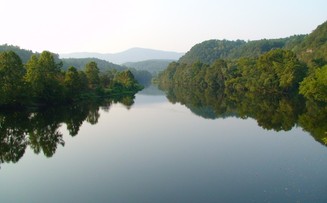A major trading and manufacturing center from Colonial times through the Civil War, and a favored location of Thomas Jefferson, Lynchburg played an important role in the history of Virginia and the James River.
Lynchburg was part of Monacan country upon the arrival of English settlers in Virginia. The region had been occupied by them and other Siouan Tutelo-speaking tribes since ca. 1270, after they drove Virginia Algonquians eastward. Explorer John Lederer visited one of the Siouan villages (Saponi) in 1670, on the Staunton River at Otter Creek, southwest of present-day Lynchburg. The Siouans occupied the area until c. 1702, when it was taken in conquest by the Seneca Iroquois. The Iroquois ceded control to the Colony of Virginia beginning in 1718, and formally at the Treaty of Albany in 1721.
First settled by the English in 1757, Lynchburg was named for its founder, John Lynch, who at the age of 17 started a ferry service at a ford across the James River to carry traffic to and from New London. Lynchburg was established by charter in 1786 at the site of Lynch's Ferry on the James River. These new easy means of transportation routed traffic through Lynchburg, and allowed it to become the new center of commerce for tobacco trading. Lynch was also responsible for Lynchburg's first bridge across the river, which replaced the ferry in 1812. The "City of Seven Hills" quickly developed along the hills surrounding Lynch's Ferry.
Tobacco and iron were the chief products of early Lynchburg. The extensive use of Lynch’s ferry system on the James River resulted in Lynchburg becoming one of the largest tobacco markets in the U. S. The James Calloway Furnace, which operated around 1770 until 1779, and the Davie Ross Furnace, which was in business from 1781 until 1837, supplied the Continental Army with pig iron and cannon balls during the American Revolution.
Thomas Jefferson designed and built a plantation home near Lynchburg, called Poplar Forest as a retreat from the hordes of visitors at Monticello. He worked on it from 1806 until his death 20 years later, and claimed to one of his correspondents that "It is the most valuable of my possessions.” In 1810, Jefferson wrote, "Lynchburg is perhaps the most rising place in the U.S.... It ranks now next to Richmond in importance..." He also remarked that "Nothing would give me greater pleasure than to be useful to the town of Lynchburg. I consider it as the most interesting spot in the state."
Lynchburg became a center of commerce and manufacture in the 19th century, and by the 1850s, Lynchburg was one of the richest towns per capita in the U.S., second only to New Bedford, Massachusetts. Chief industries were tobacco, iron and steel. Transportation facilities included the James River Bateau on the James River, and later, the James River and Kanawha Canal and, still later, four railroads, including the Virginia and Tennessee Railroad and the Norfolk and Petersburg Railroad.
During the Civil War, Lynchburg, which served as a Confederate supply base, was approached within 1-mile (1.6 km) by the Union forces of General David Hunter as he drove south from the Shenandoah Valley. Under the false impression that the Confederate forces stationed in Lynchburg were much larger than anticipated, Hunter was repelled by the forces of Confederate General Jubal Early on June 18, 1864, in the Battle of Lynchburg. To create the false impression, a train was continuously run up and down the tracks while the citizens of Lynchburg cheered as if reinforcements were unloading. Local prostitutes took part in the deception, misinforming their Union clients of the large number of Confederate reinforcements. Lynchburg thus became the only major city in Virginia that did not fall to the Union in the American Civil War.
From April 6–10, 1865, Lynchburg served as the Capital of Virginia. Under Gov. William Smith, the executive and legislative branches of the commonwealth moved to Lynchburg for the few days between the fall of Richmond and the fall of the Confederacy.
This article was adapted from the following articles:
Lynchburg, Virginia, Wikipedia
The History of Lynchburg, Virginia, City of Lynchburg
Lynchburg's History, Lynchburg Historical Foundation
For more information about the history of Lynchburg, visit the Lynchburg Historical Foundation
Comment
You Might Also Like
James River Batteau Festival
Imagine a time without paved roads, railways or internal combustion engines. A time early in our nation’s history when the land was wild, and rivers - not interstates -provided the most expeditious means of exploration and commerce. Such was …
An Attack in Defense- March 22, 1622
Some of the most important and interesting American history took place along the James River, and the Indian Uprising of March 22, 1622 is no exception. On this Good Friday four centuries ago, Algonquian Indians loyal to Powhatan’s predecessor,…
The Origins of Richmond
With its strategic location at the Falls of the James, Richmond has been an important political, military and economic hub since before the arrival of Europeans. It was the capital of the Powhatan tribe long before it was the capital of the Virginia …







